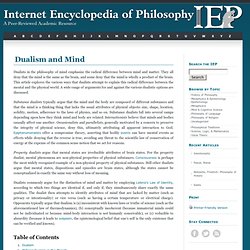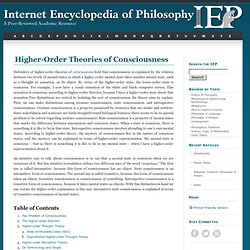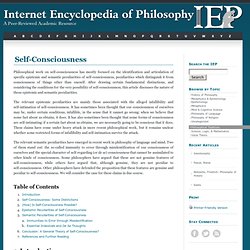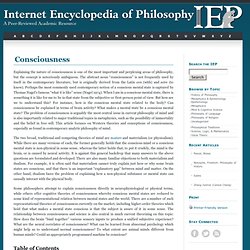

Internet Encyclopedia of Philosophy. Personal Identity What does being the person that you are, from one day to the next, necessarily consist in?

This is the question of personal identity, and it is literally a question of life and death, as the correct answer to it determines which types of changes a person can undergo without ceasing to exist. Personal identity theory is the philosophical confrontation with the most ultimate questions of our own existence: who are we, and is there a life after death? In distinguishing those changes in a person that constitute survival from those changes in a person that constitute death, a criterion of personal identity through time is given.
Such a criterion specifies, insofar as that is possible, the necessary and sufficient conditions for the survival of persons. One popular criterion, associated with Plato, Descartes and a number of world religions, is that persons are immaterial souls or pure egos. Table of Contents 1. A. B. 2. …a physiological criterion of personal identity is false. a. B. Dualism and Mind Dualists in the philosophy of mind emphasize the radical difference between mind and matter.

They all deny that the mind is the same as the brain, and some deny that the mind is wholly a product of the brain. This article explores the various ways that dualists attempt to explain this radical difference between the mental and the physical world. A wide range of arguments for and against the various dualistic options are discussed. Substance dualists typically argue that the mind and the body are composed of different substances and that the mind is a thinking thing that lacks the usual attributes of physical objects: size, shape, location, solidity, motion, adherence to the laws of physics, and so on. Substance dualists fall into several camps depending upon how they think mind and body are related.
Property dualists argue that mental states are irreducible attributes of brain states. Table of Contents 1. Two other forms of substance dualism are occasionalism and parallelism. 2. A. B. Consciousness, Higher-Order Theories of Defenders of higher-order theories of consciousness hold that consciousness is explained by the relation between two levels of mental states in which a higher-order mental state takes another mental state, such as a thought or sensation, as its object.

By virtue of the higher-order state, the lower-order state is conscious. For example, I now have a visual sensation of the white and black computer screen. This sensation is conscious, according to higher-order theories, because I have a higher-order state about that sensation.Two distinctions are central to isolating the sort of consciousness the theory aims to explain. Self-Consciousness
Philosophical work on self-consciousness has mostly focused on the identification and articulation of specific epistemic and semantic peculiarities of self-consciousness, peculiarities which distinguish it from consciousness of things other than oneself.

After drawing certain fundamental distinctions, and considering the conditions for the very possibility of self-consciousness, this article discusses the nature of those epistemic and semantic peculiarities. The relevant epistemic peculiarities are mainly those associated with the alleged infallibility and self-intimation of self-consciousness. It has sometimes been thought that our consciousness of ourselves may be, under certain conditions, infallible, in the sense that it cannot go wrong: when we believe that some fact about us obtains, it does. It has also sometimes been thought that some forms of consciousness are self-intimating: if a certain fact about us obtains, we are necessarily going to be conscious that it does. 1. 2. 3. Consciousness Explaining the nature of consciousness is one of the most important and perplexing areas of philosophy, but the concept is notoriously ambiguous.

The abstract noun “consciousness” is not frequently used by itself in the contemporary literature, but is originally derived from the Latin con (with) and scire (to know). Perhaps the most commonly used contemporary notion of a conscious mental state is captured by Thomas Nagel’s famous “what it is like” sense (Nagel 1974). When I am in a conscious mental state, there is something it is like for me to be in that state from the subjective or first-person point of view.
But how are we to understand this? Philosophy. Philosophy is the study of general and fundamental problems, such as those connected with reality, existence, knowledge, values, reason, mind, and language.[1][2] Philosophy is distinguished from other ways of addressing such problems by its critical, generally systematic approach and its reliance on rational argument.[3] In more casual speech, by extension, "philosophy" can refer to "the most basic beliefs, concepts, and attitudes of an individual or group".[4] The word "philosophy" comes from the Ancient Greek φιλοσοφία (philosophia), which literally means "love of wisdom".[5][6][7] The introduction of the terms "philosopher" and "philosophy" has been ascribed to the Greek thinker Pythagoras.[8] Areas of inquiry Philosophy is divided into many sub-fields.

These include epistemology, logic, metaphysics, ethics, and aesthetics.[9][10] Some of the major areas of study are considered individually below. Epistemology Rationalism is the emphasis on reasoning as a source of knowledge. Logic.